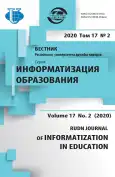Improving the quality of Portuguese SMEs through competence evaluation
- Authors: Garcia A.C.1, Silva M.C.1
-
Affiliations:
- NOVA University
- Issue: Vol 17, No 2 (2020)
- Pages: 83-93
- Section: INNOVATION PEDAGOGICAL TECHNOLOGIES IN EDUCATION
- URL: https://journal-vniispk.ru/2312-8631/article/view/321239
- DOI: https://doi.org/10.22363/2312-8631-2020-17-2-83-93
- ID: 321239
Cite item
Full Text
Abstract
About the authors
Ana C.M. Garcia
NOVA University
Email: ana_catarina_garcia@hotmail.com
worker of Interdisciplinary Centre of Social Sciences Avenida de Berna, 26 C, Lisbon, 1069-061, Portuguese Republic
Maria C.V. Silva
NOVA University
Email: mcvs@fcsh.unl.pt
worker of NOVA School of Social Sciences and Humanities, Interdisciplinary Centre of Social Sciences Avenida de Berna, 26 C, Lisbon, 1069-061, Portuguese Republic
References
- Amado J. Coursebook on qualitative research. Manual de investigação qualitativa em educação. Coimbra: Coimbra University Press; 2014.
- Bogdan R, Biklen S. Qualitative research in education. Investigação qualitativa em educação. Oporto: Oporto Press; 1994.
- Duvekot R, Halba B, Aagaard K, Gabrscek S, Murray J. VPL is about empowerment, employability and lifelong learning. The power of VPL: Validation of prior learning as a multi-targeted approach for access to learning opportunities for all (p. 7-19). Brussels: European Commission; 2014.
- Duvekot R, Halba B, Aagaard K, Gabrscek S, Murray J. Breaking ground for validation of prior learning in lifelong learning strategies. The power of VPL: Validation of prior learning as a multi-targeted approach for access to learning opportunities for all (p. 21-382). Brussels: European Commission; 2014.
- Duvekot R, Halba B, Aagaard K, Gabrscek S, Murray J. Still hiding for the bottom-up approach: The Netherlands - a case of VPL in itself. The power of VPL: Validation of prior learning as a multi-targeted approach for access to learning opportunities for all (p. 241-268). Brussels: European Commission; 2014.
- Estrela A. Theory and practice of class observation. Teoria e prática de observação de classes. Porto: Porto Editora; 1994.
- Jackson LTB, Vijver FJR. Multiculturalism in the workplace: Model and test. Journal of Human Resource Management. 2018;(16):1-15.
- Kramsch C. Teaching foreign languages in an era of globalization: Introduction. The Modern Language Journal. 2014;98(1):296-311.
- Lima LC. Learning to earn, knowledge to compete: On the subordination of education in the “learning society”. Aprender para ganhar, conhecer para competir: Sobre a subordinação da educação na “sociedade da aprendizagem”. São Paulo: Cortez Press; 2012.
- Muñoz JC, Redecker C, Vuorikari R, Punie Y. Open education 2030: Planning the future of adult learning in Europe. Open Learning: The Journal of Open, Distance and e-Learning. 2013;(28):171-186.
- Organisation for Economic Co-operation and Development. OECD skills Outlook 2017: Skills and global value chains. Paris: OECD Publishing; 2017.
- Saar E, Räis ML. Participation in job-related training in European countries: The impact of skill supply and demand characteristics. Journal of Education and Work. 2017; 30(5):531-551.
- Stephan WG, Stephan CW. Designing intercultural education and training programs: An evidence-based approach. International Journal of Intercultural Relations. 2013;(37): 277-286.
- Tett L. Lifelong learning policies, paradoxes and possibilities. Adult Learner: The Irish Journal of Adult and Community Education. 2014;(1):15-28.
- Vilelas J. Research: The process of the construction of knowledge. Investigação: O processo de construção do conhecimento. Lisbon: Sílabo Press; 2017.
- World Economic Forum. Realizing human potential in the fourth industrial revolution: An agenda for leaders to shape the future of education, gender and work. Geneva: World Economic Forum Publishing; 2017.
- Worp K, Cenoz J, Gorter D. From bilingualism to multilingualism in the workplace: The case of the Basque Autonomous Community. Language Policy. 2017;16(4):407-432.
Supplementary files









